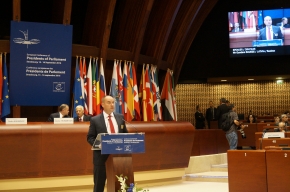 Galerie
Galerie
At a discussion about the role and responsibilities of parliaments in the migration and refugee crisis in Europe in the framework of the European Summit of Presidents and Speakers of Parliament in Strasbourg, Gundars Daudze, Deputy Speaker of the Saeima, said: “European parliaments have to re-think their current approach to the migration crisis. It is the task of the national parliaments to find the middle ground, where the interests of their citizens are protected, whilst also providing as much help as possible to people fleeing actual warfare. It is important that parliaments adopt well-considered legislation precluding potential and unwanted risks; assistance should only be provided to those who truly need it, but not to people who are trying to take advantage of the situation.”
The Deputy Speaker of the Saeima proceeded to say that it is not fair to compare the current migration crisis with those seen in the past: “Europe cannot open its doors to anyone as it did during and after World War II. However, we also cannot deem all asylum seekers as personae non grata in Europe.”
“Undeniably, it is our collective responsibility to help those in need, to protect people from persecution and the horrors of war. The solution to the migration crisis lies in scrupulous screening and control of the asylum seekers, while maintaining a humane attitude,” said Daudze.
“Only when the relevant security agencies conduct meticulous screening of each and every asylum seeker will we succeed in helping and protecting those in actual need. It is essential that the screening allows us to reject those who try to enter our territories with malicious intent,” said Daudze, adding the important role of parliamentary cooperation among the European countries in resolving this issue.
The European Conference of Presidents of Parliaments is held once every two years, at the Council of Europe Headquarters in Strasbourg and at a member state of the Council of Europe alternately. Founded in 1949, the Council of Europe is the oldest political organisation in Europe, which currently brings together 47 European countries. The aims of the Council are to protect human rights, parliamentary democracy, and the rule of law, to harmonise social and legal standards of its member states, as well as to promote understanding of European identity and values by embracing the cultural diversity of European nations.
Photos: https://www.flickr.com/photos/saeima/albums/72157673938751625
Saeima Press Service







